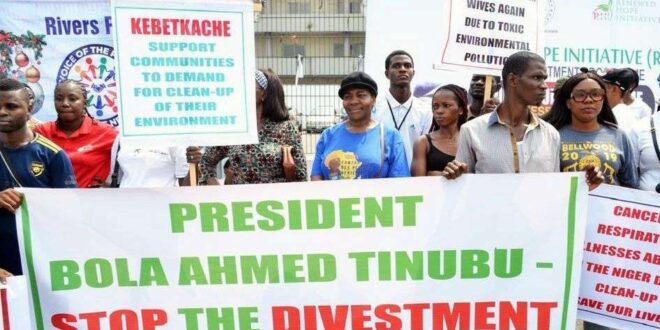By Kelechi Nwaucha
Women in the Niger Delta, civil society organizations, community leaders and other groups on Tuesday embarked on a protest march in Port Harcourt, in a call for a halt to onshore divestments by oil companies operating in the region.
This followed what the protesters described as IOCs’ “hasty divestment from the Niger Delta region, without due consultation of the impacted community people, nor full remediation and restoration of the degraded environment.”
They particularly called on President Bola Tinubu to sustain the Nigeria Upstream Petroleum Regulatory Commission’s rejection of Shell’s request to sell its remaining shares in the Shell Petroleum Development Company (SPDC).
The march, which originated from the popular Isaac Boro Park, with support from Kebetkache Women Development and Resource Centre and its partner CSOs, saw protesters carrying placards with inscriptions such as: ‘Our Farmlands and Creeks are Gone Due to Shell’s Activities,’ ‘Aminigboko Community Hold Shell Liable for its Environmental Pollution and Genocide,’ ‘Ogoni Lands still Polluted. Stop the Divestments Now,’ among others.
In a release titled ‘Urgent Call to Halt All Divestments In The Niger Delta, Including Shell’s Refused Sale Of SPDC Shares,’ civil society organizations, community leaders and concerned citizens from across Nigeria called on President Tinubu to “stand with the people of the Niger Delta and uphold the values of justice, fairness, and environmental protection.”
The release, signed by Reverend Nnimmo Bassey (Health of Mother Earth Foundation, HOMEF); Dr. Isaac ‘Asume’ Osuoka (Social Action Nigeria); Olanrewaju Suraju (HEDA Resource Centre) and Dr Emem Okon (Kebetkache Women Development and Resource Centre), described any possible approval of the sale of Shell’s and Total’s assets as a “Declaration of War with the Niger Delta.”
“We want to make it absolutely clear: approving Shell’s or TotalEnergies’ divestment in its current form without addressing the profound environmental and social costs would be a grave injustice to the people of the Niger Delta and could lead to significant unrest in the region.
“It would be an affront to the generations of Niger Deltans who have fought and died for environmental justice, their homes, and their livelihoods.
“Approving Shell’s SPDC share sale would send a dangerous message to all multinational corporations operating in Nigeria that they can extract our resources, leave devastation behind, and walk away without consequence. This is not just a question of corporate accountability; it is about Nigeria’s sovereignty, dignity, and the right of its people to live in a clean and safe environment.”
Reverend Bassey and others pointed out that NUPRC’s refusal “was based on legitimate concerns, including Shell’s failure to adequately address the significant environmental and social liabilities associated with its operations in the Niger Delta, as was independently assessed and recommended by international assessors contracted by the country.
“NUPRC’s rejection was in line with the responsibilities outlined under Nigerian law and global best practices for corporate accountability. It is a decision rooted in national interest — protecting the health, safety, and environment of the Niger Delta communities.”
They argued that “The environmental and health crises caused by Shell and other oil corporations operating in the Niger Delta are well documented. The United Nations Environment Programme’s (UNEP) report on Ogoniland describes an ecological disaster of immense proportions. UNEP’s findings revealed that: Drinking water sources are contaminated with dangerous levels of hydrocarbons, making them unsafe for human consumption.
“UNEP’s assessment concluded that decades of oil spills have created an “environmental catastrophe” in Ogoniland and the cost of cleaning up the contamination in Ogoniland alone is estimated to be over $1 billion and would take decades to address. Yet, these costs are still insufficient to cover the broader environmental impacts of oil extraction across the Niger Delta, where similar damages exist.
“The Bayelsa State Oil and Environment Commission’s (BSOEC) report provides a detailed analysis of the severe pollution caused by Shell’s and other multinational companies’ operations, including health impacts on local populations. According to the BSOEC the cost of remediating the damage in Bayelsa State alone would exceed $12 billion.”
Reverend Bassey and others said that “Based on the UNEP and BSOEC reports, it would take about $100 billion to address the environmental damage in the entire Niger Delta comprehensively.
Citing “dangerous lessons from past asset sales,” such as the case of Shell’s divestment in Nembe to Aiteo and unresolved pollution issues in the local communities, and ExxonMobil’s divestment to new operators, who were ill-prepared to manage the legacy of contamination, Reverend Bassey said these sales not only failed to address the critical environmental liabilities but also deepened the social tensions in the Niger Delta.
“We ask Mr. President to ensure that the immediate financial interests of a few multinational corporations and local profiteers do not outweigh the health, future, and survival of millions of Nigerians who have suffered for decades,” they said.
 PH Mundial – Port Harcourt Online Newspaper News Across The Region
PH Mundial – Port Harcourt Online Newspaper News Across The Region





